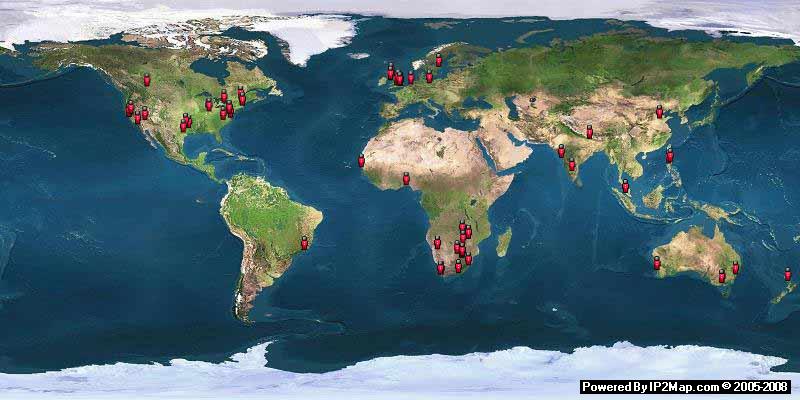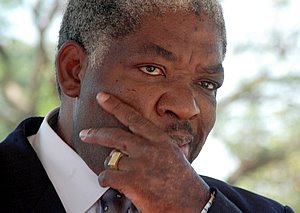28 April 2007
By Sam Moyo
Zimbabwe's colonial distribution of land was unjust and needed redress. White individuals and corporate land owners held about 4 000 farms in landholdings averaging more than 2 000 hectares. By 2000, policy and laws, markets and international intervention had failed to transform change this. By the early 1990's most blacks were still marginalised. Agricultural production and exports grew, but enriched a few. Deindustrialisation, massive retrenchments and wage erosion ensued.
A generation of young graduates could not find meaningful jobs. Aspiring black capitalists failed to compete with established white businesses and farmers. Income and wealth inequalities grew. National debt grew, as did dependence on erratic external financial flows and aid. Small farmers' food production and incomes, which had been bolstered in the 1980s by state support, became precarious. Farm labour conditions deteriorated. Rural and urban landlessness grew and agitation intensified leading to a revived politics of land reclamation by 1997, and opposition to it.
The fast-track reform process was complex. Redistribution has redressed the imbalanced racial legacy, but has spawned new inequalities as well as challenges to the outcome by former land owners. Reforms extended access to land to more than 150 000 families and significantly downsized the average size of commercial landholdings. More than 120 000 beneficiary families hold less than 100ha each. About 12 000 new medium scale farms now exist with an average of 200ha each.
But there are still approximately 4 000 landholders with farms of about 700ha each. These include foreign landholders, large agro-industrial corporate estates and conservancies, individual white farmers, and old and new black farmers. Less than 10% of the land beneficiaries are former farmworkers. There are still 200 000 agricultural workers, most of whom continue to reside as farm tenants on redistributed land without secure land rights, and those displaced to communal and other areas.
A significant number of poor peasants, women and various other middle class peoples also claim to have been excluded from the redistribution. The tenure of the significant number of white farmers who remain is contested around questions of parity and privilege. Access and ownership have in general been democratised, although there is continued politicisation of reform, by both ruling and oppositional forces.
The main effect of reform has been to transform agrarian social and labour relations, as well as land utilisation. It increased the range of self- and family-operated farms. Agricultural production declined by about 50% since 2001, as did full-time agricultural jobs and wage levels. There primary debate now is over what caused the decline -- whether it was the land transfers and tenure change or other factors. Production declined for various reasons, which suggests that recovery is feasible.
Production of the staple maize, for instance, suffered severely, not because of land transfers but due to the frequent droughts and inputs shortages. Tobacco, wheat and oilseeds production declined due to reduced areas planted on the transferred land, limited financing of new farmers and their limited skills. Loss and withdrawal of farm machinery and irrigation equipment affected plantings for most crops. Reduced livestock production arose from rapid cattle slaughtering and rustling, limited breeding stocks and limited skills. There was also a decline in private agricultural financing.
The reduction of agro-industrial capacity to supply inputs, largely because of forex shortages and price controls, affected production of all crops. International sanctions also affected the sector.
Agricultural production can be recuperated in the medium term, but reversal of the land redistribution is neither a prerequisite for this nor politically feasible. Sustainable land utilisation requires key land, agricultural and economic policy reform measures. The process of land distribution needs to be concluded and compensation for land improvements should be speeded up.
The security of leasehold land tenure among "commercial" farmers can be improved by making leases transferable and by enabling financial institutions to secure their loans. A sustainable agrarian reform strategy should consistently focus on improving the livelihoods of the majority. Smallholders can play a critical role in future production, if policies are supportive of them.
Professor Sam Moyo is executive director for the Institute for Agrarian Studies in Harare
A generation of young graduates could not find meaningful jobs. Aspiring black capitalists failed to compete with established white businesses and farmers. Income and wealth inequalities grew. National debt grew, as did dependence on erratic external financial flows and aid. Small farmers' food production and incomes, which had been bolstered in the 1980s by state support, became precarious. Farm labour conditions deteriorated. Rural and urban landlessness grew and agitation intensified leading to a revived politics of land reclamation by 1997, and opposition to it.
The fast-track reform process was complex. Redistribution has redressed the imbalanced racial legacy, but has spawned new inequalities as well as challenges to the outcome by former land owners. Reforms extended access to land to more than 150 000 families and significantly downsized the average size of commercial landholdings. More than 120 000 beneficiary families hold less than 100ha each. About 12 000 new medium scale farms now exist with an average of 200ha each.
But there are still approximately 4 000 landholders with farms of about 700ha each. These include foreign landholders, large agro-industrial corporate estates and conservancies, individual white farmers, and old and new black farmers. Less than 10% of the land beneficiaries are former farmworkers. There are still 200 000 agricultural workers, most of whom continue to reside as farm tenants on redistributed land without secure land rights, and those displaced to communal and other areas.
A significant number of poor peasants, women and various other middle class peoples also claim to have been excluded from the redistribution. The tenure of the significant number of white farmers who remain is contested around questions of parity and privilege. Access and ownership have in general been democratised, although there is continued politicisation of reform, by both ruling and oppositional forces.
The main effect of reform has been to transform agrarian social and labour relations, as well as land utilisation. It increased the range of self- and family-operated farms. Agricultural production declined by about 50% since 2001, as did full-time agricultural jobs and wage levels. There primary debate now is over what caused the decline -- whether it was the land transfers and tenure change or other factors. Production declined for various reasons, which suggests that recovery is feasible.
Production of the staple maize, for instance, suffered severely, not because of land transfers but due to the frequent droughts and inputs shortages. Tobacco, wheat and oilseeds production declined due to reduced areas planted on the transferred land, limited financing of new farmers and their limited skills. Loss and withdrawal of farm machinery and irrigation equipment affected plantings for most crops. Reduced livestock production arose from rapid cattle slaughtering and rustling, limited breeding stocks and limited skills. There was also a decline in private agricultural financing.
The reduction of agro-industrial capacity to supply inputs, largely because of forex shortages and price controls, affected production of all crops. International sanctions also affected the sector.
Agricultural production can be recuperated in the medium term, but reversal of the land redistribution is neither a prerequisite for this nor politically feasible. Sustainable land utilisation requires key land, agricultural and economic policy reform measures. The process of land distribution needs to be concluded and compensation for land improvements should be speeded up.
The security of leasehold land tenure among "commercial" farmers can be improved by making leases transferable and by enabling financial institutions to secure their loans. A sustainable agrarian reform strategy should consistently focus on improving the livelihoods of the majority. Smallholders can play a critical role in future production, if policies are supportive of them.
Professor Sam Moyo is executive director for the Institute for Agrarian Studies in Harare
Do you have a story? Then e-mail news@nehandaradio.com . If its a good one you might earn yourself money for the effort.
For general comments and feedback e-mail: editor@nehandaradio.com
Yahoo! Answers - Got a question? Someone out there knows the answer. Try it now.











No comments:
Post a Comment